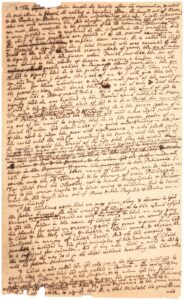
A rare and important autograph manuscript by Sir Isaac Newton declaring his personal religious beliefs and the fundamental principles of Christian faith will be offered on June 2nd.
Widely considered the most influential physicist and mathematician of all time, Newton here expounds his less-familiar but evocative and well considered views of theology, which were a key part of the overall world view which sustained his ground-breaking theories. Numbering some 1000 words, and dating from around 1690, the document begins with the elements of worship on which “all Christians agree” – which worship Newton asserts is “included in the first principles of the doctrine of Christ and is sufficient for salvation” – Newton states: …that we may give glory & honour to God the father because he hath created all things & to the Lamb of God because he hath redeemed us with his blood & is our Lord, & that we may pray to God the father in the name of Christ for what we want, & give him thanks for what we receive, & wish for grace & peace from God & Christ & the Holy Ghost, & baptize in their name, & receive the Eucharist in memory of Christs death.
In what is perhaps intended as both a defense of Protestant diversity and a justification of his own further personal views on Christ, Newton adds to his statement “And if any man hath a mind to add to this worship he may do it in his closet without troubling the Churches with his private sentiments.”
The present manuscript is from the Portsmouth Papers, part of the collection of both scientific and “not-scientific” papers donated by the Fifth Earl of Portsmouth to Cambridge University in 1872. The bulk of the collection was auctioned off at Sotheby’s in the summer of 1936, bringing to light many previously hidden facets of Newton’s broad range of interests.
The manuscript testifies both to the depth of the great natural philosopher’s religious convictions and to his Biblical scholarship. Beyond a statement of the fundamental principles of faith, Newton also here explains how to understand the major names by which Jesus is referenced in the New Testament (“Son of God,” “son of man,” etc.), and he further explains the meaning of the word “Anti-Christ.”
Newton manuscripts of such quality and length are extremely rare in private hands, with the great majority of Newton manuscripts residing in institutional collections.